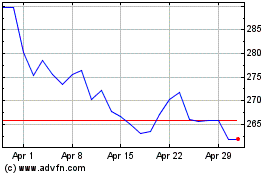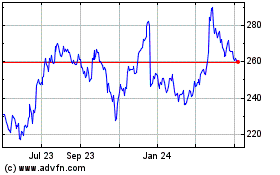By Jennifer Smith
The mass distribution of Covid-19 vaccines in the U.S. will rely
in part on a small circle of trucking companies with the experience
and equipment needed to deliver the fragile doses intact on
critical legs of the rollout.
The trucks outfitted for refrigerated transport are part of a
sprawling and complex logistics network aimed at delivering the
vaccine developed by Pfizer Inc. and BioNTech SE intact and as
rapidly as possible to U.S. hospitals, public health departments,
clinics and other sites where the shots are being administered.
The doses are stored in shipping boxes packed with dry ice and
must be kept at ultracold temperatures as they move from Pfizer
facilities to distribution hubs to inoculation sites. United Parcel
Service Inc. and FedEx Corp. deliver the doses via air and truck to
the states and territories receiving them within one or two days.
Commercial fleets with expertise in moving pharmaceutical products
are assisting on that first part of the journey and in some cases
on last-mile delivery of the shots.
The road transport piece of the logistics puzzle began some 36
hours after the Food and Drug Administration authorized the Pfizer
and BioNTech vaccine, as FedEx, UPS and Boyle Transportation trucks
pulled out of the Pfizer plant in Kalamazoo, Mich.
"We were up and in the truck at 5:30 a.m.," said truck driver
Bonnie Brewer, who moved one of the first vaccine shipments on
Sunday from the Pfizer plant to a UPS facility in Lansing,
Mich.
Ms. Brewer and her husband, Mike Kirkhoff, drive as a team for
Billerica, Mass.-based Boyle Transportation, which specializes in
secure, temperature-controlled transport. The pair have decades of
experience on the road and were chosen for this job in part because
of their safe driving record, a Boyle executive said.
They got to the Pfizer facility at 6:14 a.m., went through
security checks and by about 8:30 a.m. everything was ready to go.
They left the site under snow flurries and were escorted by law
enforcement to the road and along some 75 miles to a UPS facility
at the Capital Region International Airport in Lansing, Mich.
When they got there about 90 minutes later, UPS took in the
trailer "and everything was smooth as it could be," said Ms.
Brewer.
"I feel very proud to do the job that I do," she said. "While
this is something that has been needed and something people were
looking forward to, and the pressure is on.... This is what we do,
and what we excel at."
The initial shipments mark the start of a complicated logistics
operation that will include hundreds of truck transports that will
deliver tens of millions of vaccines over the coming months to
populations weary from the Covid-19 pandemic's heavy toll.
Vaccine candidates from other manufacturers, including the shot
from Moderna Inc. now under FDA review, will be distributed by
McKesson Corp., the largest seasonal flu vaccine distributor in the
U.S., through an existing contract with the Centers for Disease
Control and Prevention.
The doses will be shipped to McKesson distribution centers for
staging alongside kits of related supplies such as syringes. FedEx
and UPS will then deliver those materials, as well as supply kits
for use with the Pfizer and BioNTech vaccine, to sites designated
by state officials.
The U.S. vaccine rollout in December will involve about 78
temperature-controlled trucks shipping from Pfizer and Moderna
domestic facilities, according to modeling by technology-market
advisory firm ABI Research. Based on the number of doses the U.S.
has agreed to purchase from both suppliers, some 632 outbound
trucks would be required in 2021, or an average of 53 trucks a
month in the U.S. Those numbers will rise if other vaccine
candidates are approved.
Moving vaccines and other pharmaceutical products with strict
temperature requirements is a delicate business. Carriers that
specialize in such shipments typically provide what is known as
temperature-validated service. Sensors and other devices monitor
conditions inside the trailer and record data to confirm that the
temperature remains within a certain range.
Fleets that work with pharmaceutical companies undergo extensive
quality audits and certifications based on global standards for the
transport of medicine. Developing that expertise "took us about 10
years," said Andrew Boyle, co-president of Boyle Transportation.
"You can't haul chicken nuggets and then transport oncology
drugs."
Carriers typically use two-driver teams for such shipments to
keep trucks moving and ensure valuable cargo isn't left
unattended.
"Having team drivers is part of our security protocol for
pharmaceutical products," said Katrina Liddell, president of global
forwarding and expedite at XPO Logistics Inc., which regularly
ships vaccines and is working with drugmakers and the companies
charged with distributing the Covid-19 shots.
XPO has tracing devices on every trailer for such shipments, and
alarms on all the doors, she said.
The vaccine rollout comes as overall U.S. trucking capacity is
tight, as businesses restock inventories and ship merchandise for
the holidays. Demand for premium services such as expedited
transport is high, and pharmaceutical specialists are also fielding
additional demand to move flu vaccines and Covid-19 test kits.
Shipping and delivering the Covid-19 shots will become more
complex as distribution moves out from large urban and suburban
areas into more remote locations with smaller populations, said
Susan Beardslee, ABI Research's principal analyst for freight
transportation and logistics.
"If you think of rural populations, you're not necessarily going
to bring a tractor-trailer in," Ms. Beardslee said. "In a remote
area, where are you going to find those drivers that are available
and used to handling [temperature-sensitive] pharmaceutical
products?"
Defense Department officials involved in planning distribution
of the Covid-19 vaccines said there is sufficient U.S. commercial
transportation capacity for the rollout and there should be no need
for extra military equipment or personnel.
"The industry is actually quite well-equipped for this," said
Robbie Neilson, chief operating officer of Cavalier Logistics, a
freight transport company based in Northern Virginia that
specializes in temperature-controlled logistics and is involved in
Covid-19 vaccine distribution efforts. "It's just that this is at a
volume that is unusual."
Mr. Neilson doesn't expect capacity constraints to slow things
down. "There's a high level of motivation to be part of this," he
said. "It's a global problem and we all want to turn the page."
Write to Jennifer Smith at jennifer.smith@wsj.com
(END) Dow Jones Newswires
December 14, 2020 18:26 ET (23:26 GMT)
Copyright (c) 2020 Dow Jones & Company, Inc.
FedEx (NYSE:FDX)
Historical Stock Chart
From Mar 2024 to Apr 2024

FedEx (NYSE:FDX)
Historical Stock Chart
From Apr 2023 to Apr 2024
